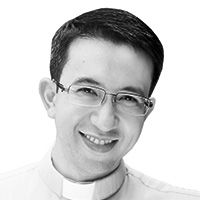How can we be more connected?

Today, the Feast of Corpus Christi, Catholics thank God for the gift of the real presence of Jesus in the Eucharist. We believe that in the consecrated bread and wine, Jesus is truly there. When we receive the Body of Christ, it is indeed Jesus we are receiving.
This may conjure up strange images that can make our heads turn and our stomachs churn. Eating someone’s body and drinking someone’s blood – isn’t this cannibalism? And how can this all happen with just a few simple gestures and words of hocus pocus? A bit of trivia: One possible origin of the phrase “hocus pocus” is that it comes from a mishearing of the Latin words used during consecration, “Hoc est enim corpus meum (This is my body).”
To survive by consuming someone else’s body and blood is actually something we have all done whether we are Catholics or not. In the womb, how else does a baby get food and drink? The mother feeds her child with her own flesh and blood. This is one way I would like to think of the Eucharist. God nourishes us with God’s very self. And as close as a mother is to her child in the womb, that embodies how God wants to be close to us. See the new facet this image gives to what Paul said in Acts 17:28, “In him we live and move and have our being.”
Eating Christ’s body and drinking Jesus’ blood – one important takeaway from this is God’s palpable desire to be intimate with us.
In the Mass, Jesus is present not only in the bread and wine. When I give Communion, I raise and look at the host then I try to make eye contact with the person receiving it. In my hands, I hold the Body of Christ, and the person in front of me is also a member of the Body of Christ. This not just pokes me but stabs me many times: I receive the Body of Christ in the bread that is blessed with great gratitude; do I receive the Body of Christ in his broken members with the same thankfulness? Do I try to build up the Body of Christ, the People of God? Or am I partly to blame for its scattering?
The Feast of Corpus Christi reminds us how much God wants to connect with us in the Eucharist. A proper response is not just to connect with God but to also connect with God’s people, who are also the Body of Christ.
We are warned these days about the rise of populism in many countries all over the world. Etymologically, one would be justified if one thought that populism was about unity. After all, the root of the word populism is the Latin populus, which means a people, a nation, a body of citizens, a corpus. But historically, populism has proven to be about division, the common folk against a perceived elite, “Us versus Them.” Populist leaders capitalize on our differences by playing on our fear of the “other,” whether they are migrants, adherents of another religion, or those involved in drugs. But the blame does not lie on the populist leaders alone. Nor can we put it solely on their followers. “Why aren’t they thinking?” is the usual complaint against them. But it is a shallow complaint. Dive deeper and feel their need to make their miseries noticed – how things haven’t worked out for them, how they want things to change. They want to be heard. Just like the people on the other side.
Everybody wants to be heard; the problem is not everyone is willing to listen. The blame then must be shouldered by all of us.
Social media was envisioned to help us be more connected with more people, but the complex algorithm behind them and our simple human tendencies connect us only with those who like what we like and think the same way we do. We unfriend those who are different from us, or we troll those whom we would want to shut up. In the end, our pages and feeds become nothing but echo chambers, and we hear nothing but ourselves.
In our Gospel today, the disciples want to just dismiss the hungry crowd. This mirrors how we also want to just dismiss those who are different from us. But Christ tells his followers, “Give them some food yourselves.” “Take responsibility for the other,” is what Jesus would tell us today. Our Lord then makes everyone sit down in groups to eat together. And when we do the same, we can all enjoy abundance.
The story has been told many times of how Mother Teresa would line up for Communion with a great hunger in her eyes for the Body of Christ. After Mass, she would go and serve the sick and the dying, bathing them and dressing their festering wounds. And she would still have the same hunger in her eyes because saw them all as the Body of Christ.
May the Body of Christ we receive at Mass enlighten us to see each other in the same way.
- Latest
- Trending


























